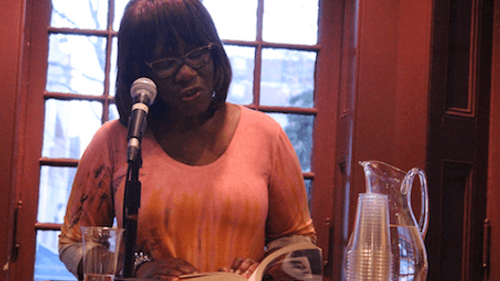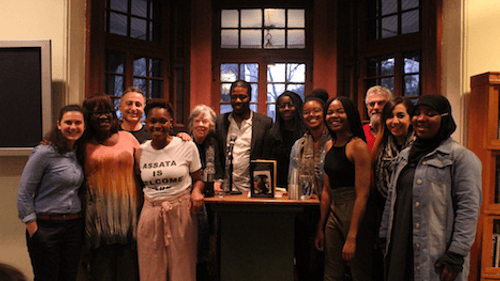Stay in the Loop
BSR publishes on a weekly schedule, with an email newsletter every Wednesday and Thursday morning. There’s no paywall, and subscribing is always free.
Poetry from poetry
'The Golden Shovel Anthology: New Poems Honoring Gwendolyn Brooks,' ed. Kahn, Shankar, Smith

Camara Brown, a senior at the University of Pennsylvania, began with a line from Gwendolyn Brooks’s poem “Truth” and an image she saw on a tombstone at the African Burial Ground National Monument in Lower Manhattan.
Then she drafted a poem on the bus ride home.
The finished piece, “What I Would Ask of Manman Brigitte after Seeing the African Burial Ground,” is part of a new anthology celebrating the centenary of Brooks’s birth through a poem form created in her honor.
A new form
The “Golden Shovel” poem structure was devised by National Book Award winner Terrance Hayes and named for Brooks’s jazz-inflected, much-anthologized “The Pool Players. Seven at the Golden Shovel.” Poets take a line from one of Brooks’s pieces and then create a new poem, each new line ending with a word – in order – from the original.
The results – 300 poems by student, emerging, and established writers – are a kind of palimpsest, old poems still traceable through the new. The original end words, lifted from their context, take on fresh shades of meaning or new parts of speech; the poems yield surprises, even to their creators. “As a writer, it feels comforting to know what word is coming next,” Brown said after a book launch and reading of The Golden Shovel Anthology at Kelly Writers House. “But you don’t know what the content is.”
For Brown, the original line from “Truth” – “Sweet is it to sleep in the coolness of snug unawareness” – yielded a poem of anguished questions about the souls of free Africans and enslaved blacks buried for centuries under Wall Street and New York’s City Hall.
Violence and communication
Other poems transmute the suffering of Brooks’s time — Emmett Till's lynching, racism faced by northbound blacks — into the horrors of our own era. They tell of police brutality, soul-sucking poverty, apartheid, and sexual violence. But the poems also spill with what the anthology’s co-editors call the “spirit and generosity” of Brooks, a Pulitzer Prize–winning poet (and the first black writer to receive the award) who, on a visit to a school, would not leave until she had spoken with every student who sought her out.

Peter Kahn, a Chicago teacher who conceived the idea for The Golden Shovel Anthology and edited it along with poets Ravi Shankar and Patricia Smith, described being awestruck by Brooks’s humility and “fierce genius” after meeting her in 1996. Smith, who read her own Golden Shovel poem, “Black, Poured Directly into the Wound,” said Brooks had helped define her own identity as a poet. “I am a first-generation Chicagoan. My parents came up from the South. My life was the rat skittering behind the stove, the fact that we had no fresh-food supermarkets in our neighborhood. . . . I felt as if I was not meant to have a voice.
“When I discovered [Brooks] . . . I realized she had written the soundtrack for the first generation of Northern colored girls. I’d never say she gave me my voice, but she pointed to it and told me where it was.”
"Living flow"
Kahn, Smith, and Shankar spent nearly six years assembling the anthology, inviting well-known writers, including Billy Collins, Nikki Giovanni and Julia Alvarez, along with younger, just-emerging writers, and high school and college-aged poets (most of them Kahn’s former or current students). Some had already written Golden Shovel poems; most were trying the structure for the first time. “Because it’s a new form, it was less intimidating,” Kahn says. “It didn’t have the weight of history behind it, like a sonnet would.”

Eleanor Wilner, who teaches at Warren Wilson College, read “Over and Over and All,” which uses a line from Brooks’s “Throwing Out the Flowers.” When writing a Golden Shovel poem, she said, “You don’t get stuck. It has a built-in, living flow, an assurance of continuation. You have outwitted your predictable self.”
Anthology contributor Christian Campbell, a Trinidadian-Bahamian poet and critic, had just attended the funeral of Derek Walcott, a poet and playwright who died March 17, 2017. “I’m feeling heavy in mourning, but with a deep sense of immeasurable thanks,” he said, “having literally thrown flowers at his casket and now here to throw flowers, in another way, at the great poet Gwendolyn Brooks.” Then he read his poem, whose scaffold was a line from Brooks’s “The Last Quatrain of the Ballad of Emmett Till”: the haunting phrase “She kisses her killed boy and she is sorry.”
Art's truth
The Golden Shovel form, and the evening itself, laid bare a truth about art: Creators always stand on one another’s shoulders, consciously or not, remaking ideas, images and language. Poetry seesaws between the familiar and the strange, the comfort of received language and the shock of the never-before-said.
The anthology — especially now, with a new president putting arts on the chopping block once again — reminds us that no legislator can squelch the irrepressible conversation, the flag of joy, or the baton of pain passed to the next poet in the relay, who grabs it and sprints ahead.
Two of the youngest writers in the room, Brown and Chicago high-school junior Kara Jackson, concluded the evening by reading the original Golden Shovel poem by Terrance Hayes:
We
sing until our blood is jazz,
we swing from June to June
We sweat to keep from we-
eping. Groomed on a die-
t of hunger, we end too soon.
What, When, Where
The Golden Shovel Anthology: New Poems Honoring Gwendolyn Brooks. Edited by Peter Kahn, Ravi Shankar, and Patricia Smith. University of Arkansas Press, 2017. 400 pages, paperback, $20, available at amazon.com.
Sign up for our newsletter
All of the week's new articles, all in one place. Sign up for the free weekly BSR newsletters, and don't miss a conversation.

 Anndee Hochman
Anndee Hochman